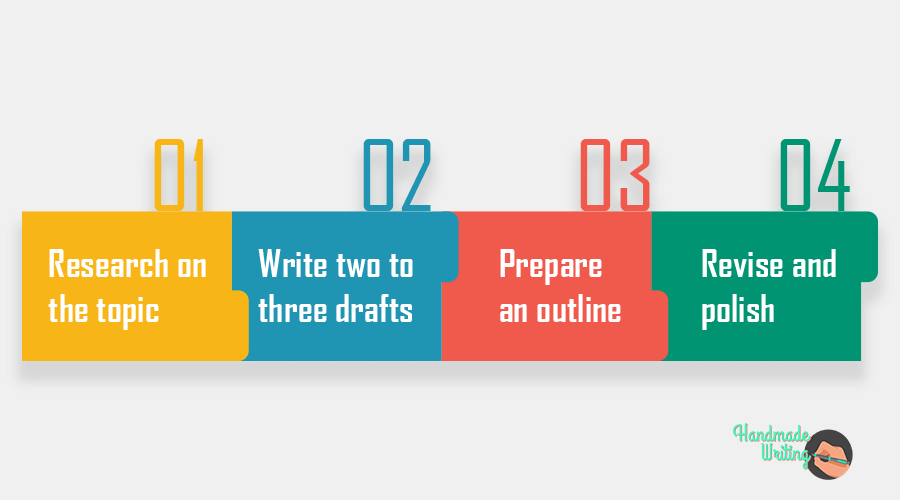What is a Thesis Statement, How Long Should It Be, and Where It Should be Placed?
A thesis statement is a brief summary that describes the central premise of your paper. It helps you demonstrate your mastery of the subject and create a context for your arguments. After reading your thesis, a reader should be able to understand your position and recognize your expertise in a particular field.
A thesis statement is usually only one or two sentences long, but it can sometimes be extended to a full paragraph. You are not presenting any evidence in the thesis, as it is merely a description of intent at this stage.
As a part of the essay introduction, a thesis statement is usually placed at the end of the first paragraph because this makes it easy for you to start the first argument. Alternatively, it can be written at the very beginning of the paper. You will repeat the statement at the end of the paper where it will be more comprehensive and serve as a summary of your treatise.
How to Get Started?
You have to start by defining what type of paper you are going to write. Depending on the type, you have to tailor your thesis statement to the specific type of paper you are writing. Consider the goal of your paper: is to persuade, teach, or explain.
A good strategy is to write a question first. Once you have defined the type of your key sentence, you need to write the premise. This you can do by creating a question first, formulating it properly, and providing an answer for it.
After you have formulated your thesis statement, you must check that it is correct. Keep in mind that your statement should be an assertion and it should answer a particular question in a way that is debatable. Be sure to check these criteria when formulating your statement.
Common Types of Thesis Statements

Not surprisingly, there are several thesis statement types that are suitable for various kinds of academic papers. Here are some more common ones:
-
The Analytical Thesis Statement. As you will see from the provided example, this sort of statement analyses the problem. It breaks down the issue into parts, components, and ideas, and then evaluates it.

-
The Explanatory Thesis Statement. This kind of statement explains a particular kind of problem.

-
The Argumentative Thesis Statement. In this type, the writer advances a particular argument on the issue, stating his or her opinion, claim, or interpretation. The writer’s aim is to convince the audience that substantial evidence backs the claim.

How to Check the Strength of Your Thesis
To begin with, your thesis must demonstrate your position on the issue. To do this, it must be clear and concise. No one appreciates a chaotic approach to a problem. People need to understand your opinion on the topic, together with the arguments that will support your claim. You should state your position “A” or “B”, then explain why you support one side of the issue.
Your position on the problem should challenge others and make them join the discussion. If it does, the reader will consume the rest of your essay in an effort to find instances of where he or she can oppose your argument. Don’t be afraid to disagree with people, as academic arguments can also lead to the development of knowledge.
A strong thesis statement is specific. It focuses on one specific problem and develops it further in detail. There should be a clear connection between the claim of your statement and the core of your paper. Otherwise, it’s necessary for you to revise the premise.
Make sure that your paper offers a unique reflection on the topic. While your topic has most likely been discussed thousands of times by the media, your job is to find a unique approach to the topic. You should represent the topic in a way that has never been done before. Use your imagination and creativity to develop a unique paper.
Your thesis must also focus on the problem, exclusively. Including irrelevancies in the thesis will make it look unprofessional.
Writing Your Thesis Statement

Now, it’s the perfect time to answer the question “how to write a thesis statement?” Whether you are writing a simple essay or a research paper, the approach is mostly the same.
First, investigate the topic thoroughly. You are intended to demonstrate your knowledge, so… show it! There shouldn’t be any questions on why you didn’t mention one or more aspects of your study. If you are discussing smoking in public, ignoring health issues will not look professional.
Second, create two to three drafts of the statement. The statement encapsulates the main thrust of your paper and will guide its content. It is useful to be able to approach your topic from more than one angle.
Third, write an outline of your paper, complete with a summary of your arguments, to see whether the construction will be suitable. Your statement should take the right spot in the outline – right before the argument is emerged or the topic discussion is initiated. Remember that the overall success of your essay or term paper depends on the structure, so now is the time to get it right.
Fourth, write and rewrite! Write the paper, then check it against your thesis; rewrite the paper, then rewrite your thesis… Do this until you feel the harmony between all the components.
Questions to Ask Yourself When Creating a Strong Thesis Statement

Am I just rephrasing someone else’s ideas?
A great thesis illustrates your unique position, even if the majority of people disagree with you. Use well-researched evidence, ideas, and concepts to prove your point. This will surely benefit you, but don’t forget that the arguments must be true!
What else?
Think about whether your thesis can be of at least some benefit to people. It is always a wonderful feeling to know that your thesis (and the paper itself!) can solve a problem. To be honest, that’s why students are often given “eco” topics: we need to find innovative ways to address global problems.
Can I make it shorter?
This is one of the most important questions to ask. If you can do it, there is nothing more to consider.
Is my thesis statement a genuine summary of the paper?
Yes, that’s a summation, but written at the beginning of the project. In essence, these few sentences are what you wrote the entire paper for.
Is it too basic?
It’s an academic piece of work, so you shouldn’t use simplified arguments. They need to be scientific and show your specialized understanding of the topic.
Can I somehow rewrite it from a different angle?
You probably can, so write three to four drafts and only choose the best. Writers all over the world do it, and it works!
Our pro essay writer help can cover any kind of academic writing task – from helping you with a thesis to taking on your whole assignment to get you an “A”. HandMadeWriting is a professional provider of custom essay writing for students.
A couple of good thesis statement examples:
- Global warming is one of the most crucial challenges today, and it can only be solved by the collaboration of all countries.
- J. Kerouac’s novel “On the Road” is a study of the introspections of young people in the US at the beginning of the 20th Century.
- Russian anti-pollution efforts should focus on big oil companies since they are the major contributors to global warming.











